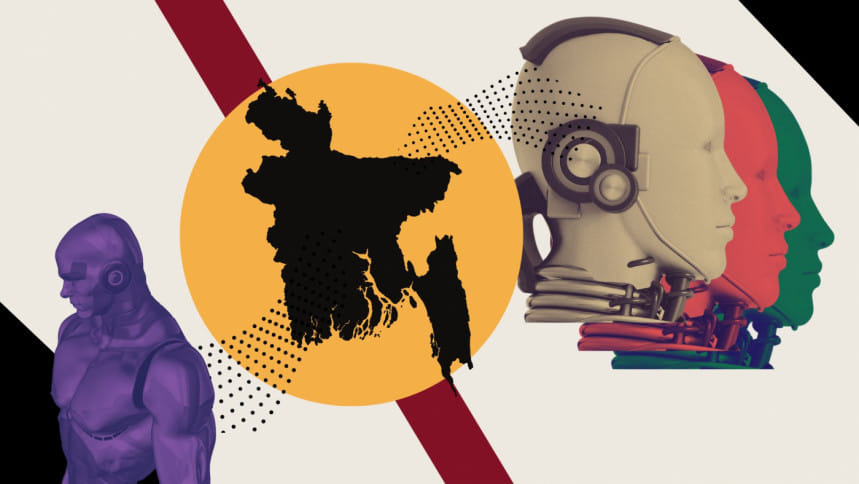Vision for an AI law in Bangladesh

We may not notice it at first glance, but the world is going through a technological renaissance in the form of Artificial Intelligence. In the bustling heart of South Asia, Bangladesh also stands on the cusp of this technological renaissance. As artificial intelligence (AI) is transforming industries worldwide, the nation is facing an urgent call to draft forward-thinking AI policy guidelines. Imagine a future where Dhaka's traffic is managed by smart systems, farmers use AI to boost crop yields, and healthcare is revolutionised by predictive analytics. In the current situation, this thought might be farfetched, but this promising horizon can come sooner rather than later if Bangladesh can establish a policy guideline that can navigate its set of challenges and responsibilities. Bangladesh must utilise the AI wave with a blend of ambition and caution, ensuring that innovation does not eclipse ethics and inclusivity.
Crafting Bangladesh's AI policy is a bit like preparing the perfect biriyani: it requires just the right mix of ingredients to create something truly remarkable. The focus should be on blending robust international cooperation to ensure trustworthy AI, with a generous helping of digital infrastructure to provide the computing power needed for innovation. Stir in public awareness and civic engagement to keep society informed and involved, sprinkle generously with investments in public research capabilities, and don't forget to season with education and skill development to prepare the workforce for future challenges. Finally, top it off with initiatives to boost connectivity and digitalisation, and a strategic vision aligned with the Fourth Industrial Revolution (4IR) to ensure sustainable growth. When these elements come together, Bangladesh can set up a tech policy that's not only cutting-edge, but also inclusive and forward-thinking. So, what elements should be on the radar of policymakers when crafting this pivotal piece of legislation?
First of all, AI's transformative potential can only be fully realised if there's a skilled workforce to harness it. Thus, the AI Act must prioritise comprehensive education and training programmes. Integrating AI into school curriculum, establishing vocational training programmes, and offering scholarships for AI-related fields are essential steps. This not only prepares the next generation for AI-driven jobs but also ensures that the current workforce is not left behind.
To position Bangladesh as a leader in AI innovation, substantial investments in AI research and development (R&D) are crucial. This involves funding interdisciplinary research collaborations between universities, research institutions, and private industries. The goal should be to advance AI capabilities in key sectors like healthcare, agriculture, and manufacturing. Think about AI research centres and innovation hubs sprouting across the country, nurturing a vibrant ecosystem of startups and entrepreneurs. We need to build a digital infrastructure. For example, we can talk about the recent policy on AI that was adopted by Vietnam. Within 2030, they want to build an "AI ecosystem." It means a fluid incorporation of AI in the commercial and research sectors. This ecosystem may include various components that work together to foster innovation, ensure ethical standards, and drive the economic and societal benefits in the country. Most importantly, to foster AI innovation in Vietnam, the government is taking a comprehensive strategy focusing on human resource development, organisational construction, research and development, and investment in AI enterprises. This includes deploying basic AI and data science skills through short and medium-term training courses for students and career-changing workers, attracting both domestic and foreign resources to build training centres, and establishing key research hubs at leading universities. Ultimately, the Vietnamese government wants to promote and attract investment capital for the growth of AI enterprises and brands in Vietnam.
Similarly, for AI to flourish, Bangladesh needs to prioritise investment in high-speed internet connectivity, cloud computing services, and data centres. This infrastructure will provide the necessary computing power and data storage capabilities for AI applications across various sectors. Building this infrastructure is another difficult but manageable task with the right collaborative efforts. If the government can encourage collaborations between itself, the private sector, and academia then Bangladesh can create a fertile ground for AI advancements tailored to local needs. And not only through local collaboration, but Bangladesh should also establish partnerships with other countries, international organisations, and tech companies to develop shared principles and standards for trustworthy AI. This can also position the country as a trustworthy player in the global AI landscape, attracting international investments and collaborations.
We have to remember that, in the current AI-driven world, data is the new oil. However, with great data comes great responsibility. Ensuring a robust data security infrastructure is paramount. The AI Act should mandate the use of cutting-edge encryption technologies, continuous monitoring systems, and regular security audits to protect sensitive information from cyber threats. This is not just about safeguarding individual privacy but also about building trust in AI systems. A data breach in a healthcare system powered by AI could have catastrophic consequences, undermining public confidence. Therefore, a comprehensive focus on data security is non-negotiable.
Another thing to note is that AI is a double-edged sword. While it has the potential to drive unprecedented progress, it also poses significant ethical challenges. The AI Act should establish clear guidelines for ethical AI deployment, ensuring transparency, accountability, and fairness. It is very easy to misuse AI and promote misinformation or biases. Nowadays, AI can create realistic but fake images, videos, and audio (deepfakes), which can be used to spread misinformation, manipulate public opinion, or damage reputations. It also increases fraud and scams because there are no established guidelines to use of AI systems. AI can perpetuate and amplify biases present in their training data, leading to discriminatory practices in hiring, lending, law enforcement, and more. So, establishing data protection laws to safeguard personal information and fostering transparency in AI decision-making processes are critical steps toward ethical AI.
All in all, crafting an AI Act for Bangladesh goes beyond technicalities, it centres on people and public engagement. Essential initiatives include public awareness campaigns to educate citizens on AI's benefits and risks, and involving diverse stakeholders—civil society, academia, and industry—in policymaking to ensure transparency and accountability. The Act should also align with Fourth Industrial Revolution (4IR) principles which emphasises innovation, digitalisation, and interconnectedness. By balancing innovation with regulation and addressing local needs while adhering to global standards, Bangladesh can harness AI's transformative power for an inclusive, ethical, and sustainable digital future.
This is Part II of a two-part series. The first part was published in Page 9 of The Daily Star on June 23, 2024.
Warda Ruheen Bristi and Shafin Haque Omlan are research associates at Bangladesh Institute of Governance and Management (BIGM).
Views expressed in this article are the authors' own.
Follow The Daily Star Opinion on Facebook for the latest opinions, commentaries and analyses by experts and professionals. To contribute your article or letter to The Daily Star Opinion, see our guidelines for submission.


 For all latest news, follow The Daily Star's Google News channel.
For all latest news, follow The Daily Star's Google News channel. 











Comments